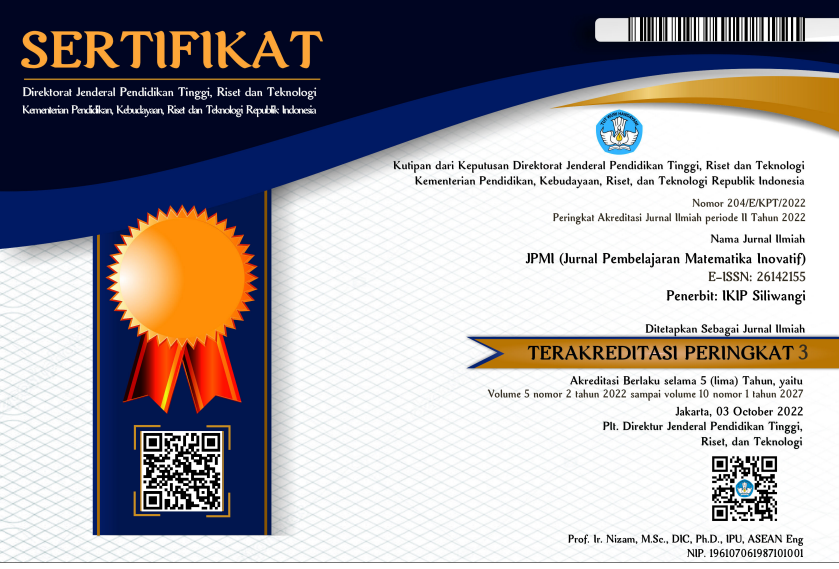KEMAMPUAN PEMAHAMAN KONSEP MATEMATIS SISWA DENGAN PEMBELAJARAN PROBLEM BASED LEARNING BERBANTUAN GEOGEBRA
DOI:
https://doi.org/10.22460/jpmi.v3i6.p%25pKeywords:
Understanding mathematical concepts, Problem Based Learning, GeogebraAbstract
This research aims to look at differences in concept comprehension capabilities using the Problem Based Learning model assisted by Geogebra Software compared to conventional learning. This research is a asi research experiment with quantitative approach using non eguivalent group research design. The population in this study is as straight as grade XI MAN 1 Takengon class XI IPA which consists of 3 classes namely XI IPA1, XI IPA2 and XI IPA3. The selection of samples using random sampling resulted in the selection of class XI IPA1 as an experimental class of 26 students and class XI IPA 3 as a control class of 27 students. The instrument used in the form of a test of mathematical understanding ability in the form of a description test. The data analysis used an independent two-sample test, as abnormal data was used by mann-whitney tests. The results showed that differences in understanding students' mathematical concepts through the application of Problem Based Learning learning models assisted by GeoGebra media in Trigonometric materials.
References
Andarwati, D. dan K. H. (2010). Pengembangan Lembar Kerja Siswa (LKS) berbasis Pendekatan Penemuan Terbimbing berbantuan GeoGebra untuk Membelajarkan Topik Trigonometri pada Siswa Kelas X SMA. Jurnal Pendidikan Matematika.
Arbain, N., & Shukor, N. A. (2015). The effects of GeoGebra on students achievement. Procedia-Social and Behavioral Sciences, 172, 208–214. https://doi.org/10.1016/j.sbspro.2015.01.356
Heruman. (2008). Model Pembelajaran Matematika di Sekolah Dasar. Rosdakarya.
Huda, M. (2014). Model-Model Pengajaran dan Pembelajaran: Isu-Isu Metodis dan Paradigmatis. Pustaka Belajar.
Ljajko, E., & Ibro, V. (2013). Development of Ideas in a GeoGebra-Aided Mathematics Instruction. Online Submission, 3(3), 1–7. https://doi.org/10.13054/mije.si.2013.01
Majerek, D. (2014). Application of Geogebra for teaching mathematics. Advances in Science and Technology Research Journal, 8(24), 51–54. https://doi.org/10.12913/22998624/567
Mulyasa, H. E. (2013). Pengembangan dan Implementasi Kurikulum 2013. Rosdakarya.
NCTM. (1989). Curriculum and Evaluation. Amerika The National of Teachers of Mathematics, INC.
Nopiyani, D., Turmudi, T., & Prabawanto, S. (2016). Penerapan pembelajaran matematika realistik berbantuan geogebra untuk meningkatkan kemampuan komunikasi matematis siswa SMP. Mosharafa: Jurnal Pendidikan Matematika, 5(2), 45–52. https://doi.org/10.31980/mosharafa.v5i2.259
Shoimin, A. (2014). 68 Model Pembelajaran Inovatif dalam Kurikulum 2013. Yogyakarta: Ar-Ruzz Media, 2014. Ar Ruzz Media.
Sukmadinata, N. S. (2005). Metode penelitian pendidikan. Program Pascasarjana Universitas Pendidikan Indonesia dengan PT Remaja.
Sundayana, R. (2016). Statistika Penelitian Pendidikan. Jakarta: Alfabeta.
Suratno, J. dan H. B. (2013). Pembelajaran Berbasis Masalah dan Perangkat Lunak Geometri Dinamis. Jurnal Matematika Dan Pendidikan Matematika, Volume 2(No. 2). https://doi.org/ISSN. 2089-855X
Susanto, A. (2014). Teori Belajar dan Pembelajaran di Sekolah Dasar. Yogyakarta: Kencana.
Van de Walle, J. A. (2008). Matematika Sekolah Dasar dan Menengah. Jakarta: Erlangga.
Wirkala, C., & Kuhn, D. (2011). Problem-based learning in K–12 education: Is it effective and how does it achieve its effects? American Educational Research Journal, 48(5), 1157–1186. https://doi.org/10.3102- /0002831211419491.

















